Archive for May, 2012

CIFA launches referee course for beginners
 (CNS): Anyone who fancies learning how to referee the ‘beautiful game’ has the opportunity to give it a try this June with the Cayman Islands Football Association (CIFA) course. In collaboration with the CIFA Referees' Department it will start a Beginners Referee Course from 18 to 26 June. CIFA is looking for people interested in becoming certified referees and assistant referees to officiate in local football matches. “Referees perform a vital role in the global sport of football, ensuring safety, fairness, equality and enjoyment,” said Bruce Blake the general secretary.
(CNS): Anyone who fancies learning how to referee the ‘beautiful game’ has the opportunity to give it a try this June with the Cayman Islands Football Association (CIFA) course. In collaboration with the CIFA Referees' Department it will start a Beginners Referee Course from 18 to 26 June. CIFA is looking for people interested in becoming certified referees and assistant referees to officiate in local football matches. “Referees perform a vital role in the global sport of football, ensuring safety, fairness, equality and enjoyment,” said Bruce Blake the general secretary.
“With the growth in football's popularity, particularly among women and youth, the demand for officials is always increasing. Joining the ranks of a CIFA referee can be your gateway to the FIFA international panel of referees,” he added.
The course is open to all interested men and women from the age of sixteen and who maintain a reasonable fitness level. Classroom sessions will be administered on June 18 – 21 with revision scheduled for June 25 followed by a theory examination on Tuesday 26 June. All sessions are scheduled to run between 6:30 p.m. and 8:30 p.m. each evening at the George Town Primary School.
For registration please send an e-mail to alfredo.whittaker@cifa.ky or marcos.tinoco@cifa.ky. You can also call tel: 949-5775/926-1868 or contact any CIFA referee.
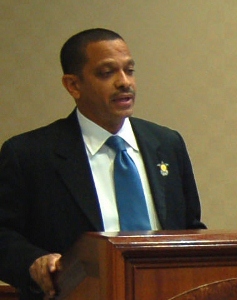
Work starts on national health policy
 (CNS): A two-day meeting to discuss and draft the Cayman Islands’ first National Health Policy and Strategic Plan started in Grand Cayman today (Thursday, 3 May). Health Minister Mark Scotland said that while the Cayman Islands has good healthcare as well as the necessary components for a good health system, a robust National Health Policy and Strategic Plan is needed to answer a growing number of challenges. He said it was an area of weakness that needed to be addressed to give the country a clear direction for the future of local health care.
(CNS): A two-day meeting to discuss and draft the Cayman Islands’ first National Health Policy and Strategic Plan started in Grand Cayman today (Thursday, 3 May). Health Minister Mark Scotland said that while the Cayman Islands has good healthcare as well as the necessary components for a good health system, a robust National Health Policy and Strategic Plan is needed to answer a growing number of challenges. He said it was an area of weakness that needed to be addressed to give the country a clear direction for the future of local health care.
“One of the gaps I identified when I took up office three years ago was the lack of an overarching, guiding policy that outlines our vision, goals and objectives for our health system Scotland at the opening of the meeting. “At a time when we face rising healthcare costs and shrinking budgets, it is imperative that we do so with a clear vision and a strong sense of direction. With a clearly defined National Health Policy we will be able to move from strategy to implementation, efficiently and purposefully.”
The formulation of the National Health Policy and Strategic Plan is facilitated by the Pan American Health Organisation (PAHO). Speaking at the opening, PAHO/WHO representative Marilyn Entwistle, Health System & Services Development Advisor for Jamaica, Cayman Islands & Bermuda, echoed the Minister’s sentiments adding that the Cayman Islands had made great strides in providing healthcare.
“While (Cayman) is the envy of the region in many aspects, there are challenges which have developed over time and the country needs a robust national health policy to address these problems, as well as the growing expectations for healthcare,” she said.
As participants got down to work Scotland urged them to pay specific attention to making healthcare more affordable, improving access and quality and promoting increased collaboration between public and private healthcare providers.
"Within the next three years the Cayman Islands health system will be the star of the Caribbean – we will be the best that we can be in patient satisfaction, accountability, quality and efficiency. We will promote public/private collaboration across the health system and we will not only treat sickness, but promote wellness,” the minister added.

Run, jog, walk, crawl or push for heart fund 5k
(CNS): The Cayman Heart Fund is looking for wide community support for its annual Discovery Day 5K walk/run on 21 May at Camana Bay. This year the charity is partnering with the Kiwanis Club & ARK in support of a fundraiser for Luis Mejia, a young boy who desperately needs heart surgery. The cost to join the event is $10 for adults & $5 for children up to 16 years of age and registration starts at 6:00am for a 7am start on The Crescent. The registration fee includes a t-shirt, on course support, snacks, water and prizes.
See registration form below
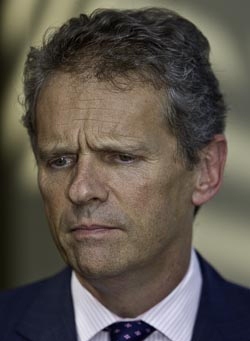
Governor denies conspiracy
 (CNS): The Cayman Islands governor has described the conspiracy theories that the FCO is working against the country or the premier as “completely without foundation”. Responding to the accusations made by both McKeeva Bush and his Cabinet colleague, Rolston Anglin, this week that the UK government was out to undermine Cayman’s success and this was the reason why the premier was under police investigation, Duncan Taylor stressed his commitment to Cayman but also added that the OT Minister had made it clear on his recent visit that he was confident the police were pursuing the investigations which involve the premier properly.
(CNS): The Cayman Islands governor has described the conspiracy theories that the FCO is working against the country or the premier as “completely without foundation”. Responding to the accusations made by both McKeeva Bush and his Cabinet colleague, Rolston Anglin, this week that the UK government was out to undermine Cayman’s success and this was the reason why the premier was under police investigation, Duncan Taylor stressed his commitment to Cayman but also added that the OT Minister had made it clear on his recent visit that he was confident the police were pursuing the investigations which involve the premier properly.
Although Taylor is currently in the UK attending a governors’ conference, he said he had seen the Cayman 27 edition of “The Panel” on Tuesday evening and other reports of the programme. In an official statement released by his office he said the allegations made by the premier and the education minister during the programme were untrue.
“The suggestion that the Foreign and Commonwealth Office or I are working against the interests of the Cayman Islands is completely without foundation,” Taylor stated.
“The UK Government’s vision for the Cayman Islands was set out clearly during the visit by the Minister for the Overseas Territories, Henry Bellingham, less than two weeks ago: a vision of a flourishing and vibrant economy, whose public finances are well managed and whose adherence to internationally recognised standards of governance enhances its reputation as a good place to live, work and do business.”
Taylor said he wholeheartedly supported that vision and would continue to devote his energy to help make it a reality.
“When I took up my responsibilities as Governor I swore an oath to 'well and truly serve Her Majesty Queen Elizabeth II … and the people of the Cayman Islands'. I am passionately committed to fulfilling the oath I made.”
Taylor also pointed out that during Bellingham’s visit to Cayman he had made it clear that he was confident that the commissioner of police and RCIPS were pursuing the three police investigations into the premier properly.
“I share that view and remain confident that the Commissioner will ensure that the RCIPS carry out their responsibilities in this regard objectively and fairly,” the governor added.
In light of revelations last month that he is the subject of three separate police investigations, the premier began pointing the finger at the FCO and suggesting the announcement’s regarding the probes were designed merely to embarrass him and try to upset relations between the UDP and the new Conservative OT Minister.
Speaking onthe panel on Tuesday evening, both Bush and Anglin indicated that they believed the FCO could not be trusted and, stopping short of calling for independence, they said they believed the “baseless allegations” surrounding Bush were connected to his having stood up to the demands of the FCO coupled with a desire to undermine the Cayman Islands success as a financial services sector.
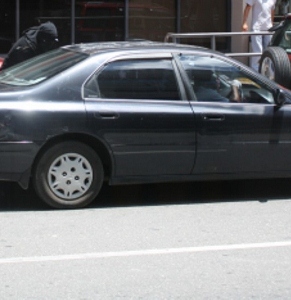
3 masked men in bank heist
 (CNS): Full story – Police say that three masked men, two of whom were armed with what appeared to be guns, held up the downtown George Town branch of Scotia Bank this morning, Thursday 3 May. Detectives have opened an investigation into the bank robbery, which took place shortly before 11:45am. As the gunmen entered Scotia Bank in Cardinal Avenue they threatened staff and customers before making off with a sum of cash. The suspects ran off from the bank and entered their getaway vehicle – a dark blue coloured Honda Accord saloon car (pictured left and below), which was parked with a waiting driver directly outside the bank. The car was then seen to drive off towards the Eastern Avenue area.
(CNS): Full story – Police say that three masked men, two of whom were armed with what appeared to be guns, held up the downtown George Town branch of Scotia Bank this morning, Thursday 3 May. Detectives have opened an investigation into the bank robbery, which took place shortly before 11:45am. As the gunmen entered Scotia Bank in Cardinal Avenue they threatened staff and customers before making off with a sum of cash. The suspects ran off from the bank and entered their getaway vehicle – a dark blue coloured Honda Accord saloon car (pictured left and below), which was parked with a waiting driver directly outside the bank. The car was then seen to drive off towards the Eastern Avenue area.
No shots were fired during the robbery and none of the staff or customers were injured.
Police officers found the car abandoned in Bronze Road a short time after the robbery, behind the Church of the New Testament off North Sound Road. At the time of the robbery the car was displaying the number 138-805.
The suspects are all male. One was approximately 6ft 3 inches in height, dark coloured skin, stocky build, wearing a light blue hooded top, dark blue jeans. The second was around 5ft 7 inches in height, slim build, wearing a black hood and a brown/grey plaid print jacket and dark trousers. The third suspect was also said to be about 5ft 7 inches in height, also with a stocky build. Police said there is no description available at this time of the getaway driver.
Shortly after the robbery police released a photograph of one of the suspects entering the waiting getaway car. This photo had been taken by a visitor and passed to police. Officers would ask anyone else who was in the area and took photos of the suspects or the car to contact them as Cardinal Avenue was busy at the time of the robbery.
In addition, anyone who was in the Bronze Road area and saw the suspects abandon the vehicle is asked to come forward.
Information can be passed to George Town CID on 949-4222, the RCIPS tip-line 949-7777 or Crime Stoppers on 800-8477(TIPS).
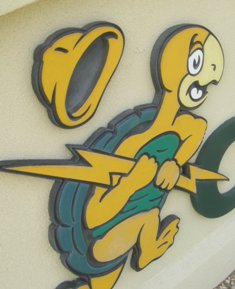
CUC applies to ERA for base rate increase
 (CNS Business): Grand Cayman’s power company has applied to the Electricity Regulatory Authority to increase its base rate by 0.7% to take effect in June. In a press release announcing its unaudited results for the first quarter ended 31 March, CUC said that its base rates, excluding fuel costs, have not changed since 2009 and remain lower than in 2002. In March 2012 it “submitted the calculation of a base rate increase of 0.7% to the Electricity Regulatory Authority for verification which would be effective for bills rendered from June 2012,” as prescribed by the terms of CUC’s licence. The firm also stated that net earnings have fallen by 39% compared to the same period in 2011. Read more on CNS Business
(CNS Business): Grand Cayman’s power company has applied to the Electricity Regulatory Authority to increase its base rate by 0.7% to take effect in June. In a press release announcing its unaudited results for the first quarter ended 31 March, CUC said that its base rates, excluding fuel costs, have not changed since 2009 and remain lower than in 2002. In March 2012 it “submitted the calculation of a base rate increase of 0.7% to the Electricity Regulatory Authority for verification which would be effective for bills rendered from June 2012,” as prescribed by the terms of CUC’s licence. The firm also stated that net earnings have fallen by 39% compared to the same period in 2011. Read more on CNS Business
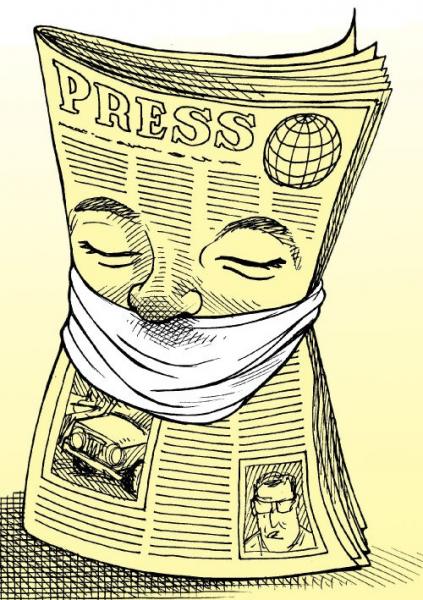
Freedom of the press still under threat
 (CNS): Gains in press freedom in the Middle East and North Africa meant that, for the first time in eight years, global media freedom did not experience an overall decline, according to a Freedom House report. But as the international community marked World Press Freedom Day on Thursday the organisaiton said that downgrades in some previously free countries prevented an overall improvement and presented a continuing threat to real press freedom. Independent media still faces challenges in some Middle East states such as Bahrain and Syria. In China, Russia, Iran, and Venezuela government still uses a variety of techniques to maintain a tight grip on the press, including detaining and jailing critics, closing down media outlets, and bringing legal cases against journalists.
(CNS): Gains in press freedom in the Middle East and North Africa meant that, for the first time in eight years, global media freedom did not experience an overall decline, according to a Freedom House report. But as the international community marked World Press Freedom Day on Thursday the organisaiton said that downgrades in some previously free countries prevented an overall improvement and presented a continuing threat to real press freedom. Independent media still faces challenges in some Middle East states such as Bahrain and Syria. In China, Russia, Iran, and Venezuela government still uses a variety of techniques to maintain a tight grip on the press, including detaining and jailing critics, closing down media outlets, and bringing legal cases against journalists.
Following threats to media freedom in a number of well-established democracies in recent years, declines in Chile and Hungary resulted in status downgrades from Free to Partly Free. Substantial deterioration was also noted in the Partly Free media environments of Ecuador, Macedonia, Malawi, Uganda, and Ukraine.
Of the 197 countries and territories assessed during 2011, a total of 66 or only 33.5% were rated Free. 72, or 36.5%, were rated Partly Free but 59 countries, or 30%, were rated Not Free. The analysis found that only 14.5% of the world’s population lives in countries with a free press.
The report, "Freedom of the Press 2012: Breakthroughs and Pushback in the Middle East", found that three countries—Egypt, Libya, and Tunisia—experienced significant improvements as a result of the Arab Spring. Dramatic gains in press freedom in Tunisia and Libya in particular marked major break throughs for countries long governed by autocratic rulers. Outside the Middle East and North Africa region, positive improvements were seen in countries including Burma, Indonesia, Niger, the Philippines, Thailand, and Zambia
“The newly opened media environments in countries like Tunisia and Libya, while still tenuous and far from perfect, are critical for the future of democratic development in the region and must be nurtured and protected,” said David J. Kramer, president of Freedom House. “Also of great concern are those countries, both in the Middle East and around the world, where authoritarian regimes are now on the defensive, creating an even more perilous situation for journalists.”
The report noted several trends driving the ongoing threats to media freedom in 2011, including censorship, information blackouts and sophisticated internet and text-message filtering. Varied challenges continue to affect free media in a number of democratic countries, including India, Israel, Italy, South Africa and South Korea, Freedom House said, adding that there is a heightened harassment of journalists and efforts by government to seize control over the legal and regulatory framework for media.
“Over the past several years, we have seen a disturbing decline in press freedom in established democracies, including this year’s downgrades of Hungary and Chile. Threats to media freedom often have a direct correlation with the country’s overall democratic performance,” said Karin Karlekar, project director of Freedom of the Press.
According to the report, the Americas experienced a worsening of press freedom in 2011. There were two negative status changes, with Chile and Guyana moving from Free to Partly Free. Ecuador saw a significant score decline, and the media environment remained extremely restrictive in Cuba and Venezuela. Mexico continued to be one of world’s most dangerous places for journalists, with high levels of violence and impunity for crimes against media workers. The United States is still one of the stronger performers in the region, but it also experienced a slight decline in 2011 due to difficulties encountered by journalists covering the Occupy protests.
Meanwhile in Europe, which has consistently boasted the highest level of press freedom worldwide, the use of super injunctions and riot-related restrictions caused a decline in the United Kingdom’s level of press freedom. Turkey’s score worsened by one point as the government continued to harass and imprison critical journalists.
The world’s eight worst-rated countries are Belarus, Cuba, Equatorial Guinea, Eritrea, Iran, North Korea, Turkmenistan andUzbekistan. In these states, independent media are either non-existent or barely able to operate, the press acts as a mouthpiece for the regime, citizens’ access to unbiased information is severely limited, and dissent is crushed through imprisonment, torture, and other forms of repression.
Reporters Without Borders also noted Thursday that a total of 21 journalists and 6 citizen journalists have been killed since the start of 2012. It said that cameramen and news photographers are also favourite targets for repressive regimes that understand only too well the impact of images and their power of providing information.
Following the Arab Spring, Reporters Without Borders has opened an office in Tunisia and plans one in Libya to encourage the government’s efforts to build a free and pluralist press.
Because of the growing dangers to which journalists are exposed, the NGO is calling on governments to implement international provisions on the protection of journalists in an effective manner. Five years after the UN Security Council adopted Resolution 1738, a status report is urgently needed on the specific steps taken to implement it.
“Governments must accept their responsibilities and obligations under paragraphs 6 and 7 to do their utmost to prevent violations of international humanitarian law against journalists and to end impunity for such violations,” the organisations stated.
See Freedom House report here
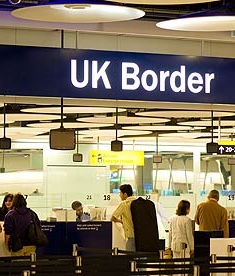
UK immigration staff may stike over retirement age
 (Breaking Travel News): Immigration workers have threatened to stage a one-day strike next week which would cause huge disruption at UK airports including Heathrow, which has already been hit by massive delays at border control. The Immigration Services Union (ISU) is disputing Government plans to increase the retirement age for public servants beyond 65. The union which represents 4,500 Border Agency staff, has threatened that its members will walk on Thursday, May 10 at airports across the UK and abroad. This would be the second time it has gone on strike in 30 years.
(Breaking Travel News): Immigration workers have threatened to stage a one-day strike next week which would cause huge disruption at UK airports including Heathrow, which has already been hit by massive delays at border control. The Immigration Services Union (ISU) is disputing Government plans to increase the retirement age for public servants beyond 65. The union which represents 4,500 Border Agency staff, has threatened that its members will walk on Thursday, May 10 at airports across the UK and abroad. This would be the second time it has gone on strike in 30 years.
Andy Friend, national chairman of ISU commented: “How can staff be expected to pursue, arrest and detain a criminal at the border in their late sixties? I urge the Cabinet Office to come back to the negotiating table and reach agreement on a retirement age of 65 for our members.”
The ISU, which calls itself ‘a moderate, non-political union’ said the strike couldbe avoided if the Government allows its members to retire at 65. The Government is already tackling complaints about long queues at passport control Heathrow and announced plans to draft in 80 extra staff.
Immigration minister Damian Green said the extra staff would start work this month and admitted things needed to change.
Go to article
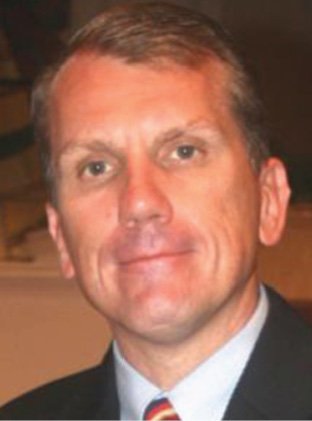
Pastor claims advice to punch gay kids was a joke
 (FayObserver): A Fayetteville pastor says he was joking when he told parents in a sermon Sunday to hit children who show signs of being gay. Sean Harris, pastor of Berean Baptist Church on Glensford Drive, said he does not advocate hitting children and wishes he could take back a remark encouraging fathers to punch boys who act effeminately. But he defended his belief in the need to reinforce traditional gender roles in children. "If I had to say it again, I would say it differently, no doubt," Harris said Tuesday. "Those weren't planned words, but what I do stand by is that the word of God makes it clear that effeminate behavior is ungodly. I'm not going to compromise on that."
(FayObserver): A Fayetteville pastor says he was joking when he told parents in a sermon Sunday to hit children who show signs of being gay. Sean Harris, pastor of Berean Baptist Church on Glensford Drive, said he does not advocate hitting children and wishes he could take back a remark encouraging fathers to punch boys who act effeminately. But he defended his belief in the need to reinforce traditional gender roles in children. "If I had to say it again, I would say it differently, no doubt," Harris said Tuesday. "Those weren't planned words, but what I do stand by is that the word of God makes it clear that effeminate behavior is ungodly. I'm not going to compromise on that."
Harris was preaching about marriage ahead of next week's vote on an amendment to the N.C. Constitution that would make marriage between a man and a woman the only legally recognized domestic union in the state. The amendment has drawn national attention in recent weeks.
Go to article and hear pastor’s sermon here
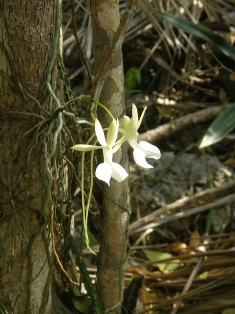
Ghost orchid blooms at the Turtle Farm
 (CNS): One of the world’s rarest flowers, the mysterious Ghost Orchid, is in bloom at the Cayman Turtle Farm, officials announced in a release Wednesday. Grand Cayman's Ghost Orchid (Dendrophylax fawcetti) is a rare, endangered and endemic native plant. The flower is a small to medium, pale cream-coloured blossom, but still subtly beautiful- especially against a leafy background. This particular orchid is often very difficult to cultivate outside of its natural habitat. The farm has two which were donated by the Orchid Society in late 2006 having been rescued from clearing work going on at the Ironwood Forest in George Town. The orchids were re-attached to two trees growing in the Blue Hole natural trial and two years later began blooming.
(CNS): One of the world’s rarest flowers, the mysterious Ghost Orchid, is in bloom at the Cayman Turtle Farm, officials announced in a release Wednesday. Grand Cayman's Ghost Orchid (Dendrophylax fawcetti) is a rare, endangered and endemic native plant. The flower is a small to medium, pale cream-coloured blossom, but still subtly beautiful- especially against a leafy background. This particular orchid is often very difficult to cultivate outside of its natural habitat. The farm has two which were donated by the Orchid Society in late 2006 having been rescued from clearing work going on at the Ironwood Forest in George Town. The orchids were re-attached to two trees growing in the Blue Hole natural trial and two years later began blooming.
After being dormant for almost two years, the first of the Turtle Farm’s Ghost Orchids bloomed in early 2008 and since then, both orchids have bloomed each year in late April or early May.
The Ghost Orchid is a unique flower, as the single pale blossom grows from a strange-looking epiphyte that more resembles a creeping vine or some sort of root system embedded in the bark of a tree, rather than an actual plant or what most people perceive an orchid plant to look like. It often seems to be suspended in mid-air, hence the name “Ghost Orchid.”
“This unique form makes the Ghost Orchid difficult to locate in the wild among the leaves, branches and vines of their arboreal woodland habitat. It is a unique and exciting natural phenomenon to observe on the Blue Hole Nature Trail,” said Geddes Hislop, who is the Curator -Terrestrial Exhibits & Education Programmes at the Cayman Turtle Farm: Island Wildlife Encounter.
The Ghost Orchid’s bloom will usually last for about two weeks. It is suspected that the flower is pollinated by a large nocturnal sphinx moth that uses its long proboscis to reach into the deep flower to feed on its nectar. This orchid is a distant relative of the African and Indian Ocean genus Angraecum. Botanists theorise that orchid seeds, blowing like dust, crossed the Atlantic at least once and successfully colonised new habitat.